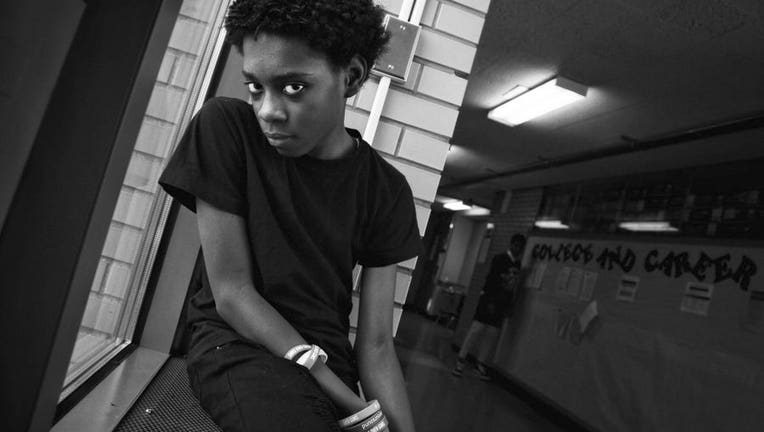Rapper Dajon Gater, 15, gunned down over most deadly weekend in Chicago this year

Dajon Gater was a precocious student of the after-school program Guitars over Guns. Dajon, 15, was killed in a shooting last Friday in Lawndale. | Andre Daniels
CHICAGO - Even in grade school, Dajon Gater had clear musical talent.
The normally quiet 15-year-old would transform himself while performing in the after-school program Guitars over Guns.
"He was a really chill, laid-back guy. And he would get on stage and turn into the coolest, smoothest dude," said his mentor Andre Daniels.
"His voice was always really laid back, but then he’d turn on the swag," said Daniels, who performs as Add-2 and helped run the organization’s rap program in Bronzeville in 2017 and 2018.
Dajon was shot and killed last Friday on the porch of his Lawndale home. Police said two gunmen approached and opened fire shortly before midnight in the 3900 block of West Lexington Street.
Dajon was shot in his head and taken to Mount Sinai Hospital, where he died three hours later. He was among 54 people shot over the weekend in Chicago, the deadliest of the year with at least 12 dead.
Police said Dajon’s shooting may have been retaliation for an "earlier altercation," but did not elaborate. Two shell casings were recovered at the home. No one was arrested.
Dajon’s older cousin said he was a "good kid" who sometimes would be goofy and crack jokes. Dajon moved to Lawndale a year or two ago with his mother and two sisters, according to the cousin, who asked not to be named.
Dejon’s music teacher recommended him to the after-school program when he was in the 6th grade because he was reserved and was unlikely to join on his own, according to Andrew DeMuro, regional director of Guitars over Guns.
"He was a quiet, young man, but was uniquely sweet and gentle, and wise beyond his years," DeMuro said.
Another after-school mentor, rapper Marisol Velez, remembers him as "kind of cocky, but also kind."
"Dajon was tinier than most of his peers, but was bigger than them in a sense," said Velez, who raps as Pinqy Ring.
Dajon and his peers began every session with an "emotional check-in," with each member listing one word to describe their day. Dajon’s was always positive.
"I don’t recall him in that circle saying he felt a negative way. He was literally a ball of energy," she said.
Velez said she was devastated by Dajon’s death and has been rewatching videos from the after-school program. "The music and the videos sort of immortalize him," she said.
The after-school program taught Dajon how to compose songs and raps, as well as the basics of sound engineering, Daniels said. Dajon learned to set up microphones and record tracks to a computer. His class wrote a five-track EP in the program at Beethoven Elementary in Bronzeville.
"He always had catchy hooks," Daniels said of Dajon, who was precocious with a surprising breadth of musical knowledge.
"He was so structured with his raps and always further ahead that there was only so much we could teach him," Daniels said. "He had his own swag, very chill and laid back, but he was also very lyrical. He was good with words. He’d say profound things."
Dajon had a unique writing style.
"You can’t really forget certain people," Daniels said. "Like when it was time to write raps, he would go over to a corner and hide behind a bookshelf and write his raps at a little desk. And I remember saying, you can’t have this little cubby by yourself. You’ve got to share that stuff. He was like, nah nah nah, that’s my spot."
Daniels, who runs his own safe space, Haven Studios, said the after-school program gave Dajon and others a creative outlet.
"That’s why it was so successful. The kids really enjoyed having a space that they could call their own — that they could have community with each other and talk about certain things… life in general," Daniels said. "That’s what kept them coming back — that community."
After Dajon died, DeMuro pulled up his 2017 exit questionnaire, which asked the students for the one thing they’d remember from the program.
"When asked what he’d always remember, he said: ‘When (my mentors) taught us how to believe in ourselves whenever we were in doubt. That was really uplifting and inspiring. It taught me how to be confident in myself at anytime.’"

Lightfoot releases civilian police oversight plan
Mayor Lori Lightfoot is recommending a seven-member council made up of Chicago residents to oversee the Chicago Police Department.

